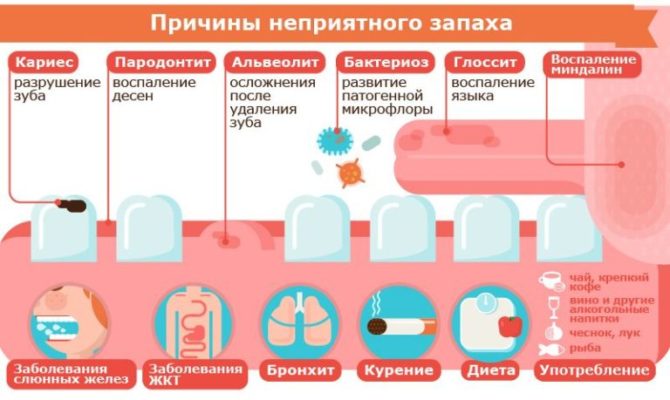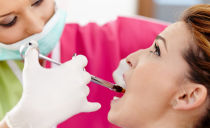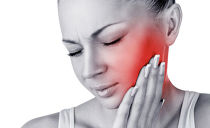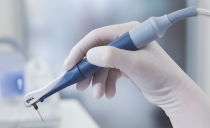What is halitosis, signs and methods of treatment with drugs and folk remedies
Communicating with people around you becomes difficult when a halitosis appears from your mouth. And this is not the only problem, since the onset of this symptom may signal internal illnessthat can cause significant harm to the body. Wanting to get rid of halitosis, people often look for ways to treat it at home. But self-medication can not always be relied upon, because the causes of the violation can be very serious.
Content
Halitosis: what is it, the main signs
Halitosis or halitosis is the recently introduced name for halitosis. Foreign aroma or amber is the only essential sign of this phenomenon, but it can have different shades depending on the provoking factor. Doctors distinguish several conditions associated with this symptom:
- Pseudogalitosis is the presence of a faint, imperceptible smell by people around, that appears during stress or other negative effects on the body.
- Halitophobia is a psychological disorder in which a person is afraid of the occurrence of bad breath.
- True halitosis is the actual presence of amber, felt not only by the person himself, but also by the people around him. It happens local - when the causes depend on the state of the oral cavity itself, and general - when the cause of the smell must be sought in the dysfunction of the internal organs.
- Temporary halitosis is an unstable unpleasant odor arising for physiological reasons: after eating fish, cabbage, garlic and other food, certain medications, or at the time of a stressful situation.
Causes of Local Halitosis
Sometimes the reason for the appearance of amber is obvious, for example, after eating spicy dishes. But if discomfort develops suddenly, persists for a long time and does not disappear even when chewing menthol chewing gum or after brushing your teeth, you should look for other factors that cause symptoms of true halitosis:
| Probable Causes | Odor Character and Related Symptoms |
|---|---|
| Poor oral hygiene, due to which the smell of the waste products of bacteria in the oral cavity is felt. | Putrid smell or aroma of rotten eggs. Accumulation of plaque on the teeth. |
| Dental diseases: carious injuries, pulpitis, infectious diseases of the oral mucosa. | Purulent or sour aroma, the latter is characteristic of candidiasis. The appearance of spots and ulcers on the gums, tongue. Signs of caries, destruction of dental tissue. |
Causes of General Halitosis
True general halitosis caused by internal disturbances can have such causes and associated symptoms:
| Probable Causes | Odor Character and Related Symptoms |
|---|---|
| Diseases of the ENT organs. | Purulent odor, nasal discharge, sore throat, cough. |
| Digestive apparatus diseases, dysbiosis, malnutrition, abuse of meat products, coffee. | The smell of rotten eggs, rotting cabbage. Pain in the internal organs, stool, vomiting. |
| Liver dysfunction. | The smell of ammonia, yellowness of the skin, indigestion. |
| Kidney disease. | The smell of ammonia, impaired urination, heart rate, pressure. |
| Diabetes. | Smell of acetone, dry mouth, dizziness. |
| Thyrotoxicosis. | The smell of ammonia, weight loss, irritability. |
| Stressful condition of the body. | Musty odor, saliva viscosity, dry mouth. |
| The presence of neoplasms in the body. | Putrid smell, pain in the area of neoplasm development, dysfunction of various organs. |
| Smoking and drinking. | The characteristic aroma of tobacco smoke or alcohol degradation products. Pathological changes in the papillae of the tongue, dry mouth, yellowing of the teeth, “smoker's cough”, deterioration of the skin’s properties, change in mental activity. |
Determining the causes and methods of treating general halitosis is only possible for doctors and only after special diagnostics. According to the accompanying symptoms, you can only navigate what diagnostic methods can be informative in a particular situation.
How to cure halitosis
Pathological halitosis provoked by internal diseases is not treated with improvised means - chewing gum, toothpastes, sweets with a high content of menthol and other aromatic additives. If they can be used to mask the amber, then after a short time the problem will return again, and over time, the symptom will intensify due to the progression of the disease. Therefore, professional diagnostics to determine the causes of halitosis is the main condition necessary for its treatment.
If you find bad breath, you should contact your dentist. If he does not find the dental causes of local halitosis, you need to go to a therapist, endocrinologist, gastroenterologist or other specialists.
After determining the disease that caused halitosis and other symptoms, you must simultaneously fight both the root cause and the unpleasant odor. Until the provoking factor is eliminated, halitosis will manifest itself again.
Treatment of local halitosis
If dental problems are found during the diagnosis, the dentist will direct the treatment of halitosis. Depending on the specific type of disease, treatment may be different:
- For infectious diseases of the oral mucosa, disinfecting rinses are recommended, as well as the use of gels and ointments of antibacterial, antiviral or antifungal effects - the choice of agent depends on the pathogen. In severe infections, you have to use drugs for oral administration: antibiotics, immunomodulatory and anti-inflammatory drugs.
- With dental diseases, their treatment or removal is indicated. Extraction is resorted to only if the disease is neglected and not treatable. Often, halitosis can be cured after filling a diseased tooth; depulpation may be necessary. After removing decaying tooth tissue and filling a hole in the tooth, in the cavity of which microbes accumulate, the fetid odor passes. But only if a bad tooth was the only reason for its appearance.
During treatment and after recovery, you should brush your teeth daily (twice a day), as well as use dental floss and rinse your mouth with water or special means after each meal.
Treatment of general halitosis with drugs
General halitosis should be treated under the supervision of a physician who will prescribe the appropriate drugs:
| Halitosis Diseases | Essential Drugs |
|---|---|
| Infections of ENT organs, digestive organs, urinary system. | Depending on the type of pathogen - antibiotics, antifungal or antiviral agents. According to indications - anti-inflammatory, antipyretic and specific drugs. |
| Dysbacteriosis, the consequences of malnutrition and poor diets. | Taking probiotics and following a proper diet. |
| Diseases of the endocrine glands. | Hormone and adjuvant therapy. |
| Liver dysfunction. | Hepatoprotectors, digestive aids and mandatory nutritional guidelines. |
| Kidney disease. | According to indications - tablets for the normalization of urination, blood pressure, other drugs. |
| Stressful conditions. | Sedatives, medications to improve the functioning of the brain and the cardiovascular system. In more complex situations - antidepressants as prescribed by the doctor. |
| Oncological diseases. | Preparations for the control of cell division, immunomodulators, painkillers. |
| Addiction to smoking and alcoholism. | If possible, self-control, it is necessary to stop smoking and drinking alcohol. In advanced cases, treatment courses with the use of special drugs are needed. |
Treatment of halitosis at home
To get rid of the symptoms of halitosis at home, you can perform the following treatment procedures:
- Rinsing the mouth with homemade decoctions. As plant materials, take chamomile, eucalyptus, calendula, oak.
- Rinsing the mouth with antiseptics - Chlorhekidin, Miramistin, soda-salt solution. Hydrogen peroxide is undesirable; it has an aggressive effect on dental tissue.
- Using homemade chewing gum from lemon juice, a few drops of tea tree oil and wax as a base - it is melted in a water bath.
To quickly eliminate amber and freshen your breath on the eve of an important meeting or event, you can:
- Brush your teeth with a high menthol paste.
- Chew on a clove inflorescence sold as a spice.
- Chew coffee beans.
- Use chewing gum or spray freshener for the oral cavity.
- Eat an apple.
These recommendations will not help cure the disease, improvised remedies act for a short time. Their effectiveness will be higher if a person previously refrains from eating sharply smelling foods: onions, cabbage, garlic, fish, alcohol.
Halitosis cannot be ignored not only because of discomfort during communication - it helps diagnose many serious diseases. The main prevention of the onset of the disease is good hygiene and proper nutrition. If such a symptom still appears, you can not treat it yourself. And even more so, do not take medications that are not approved by the doctor, especially antibiotics.







